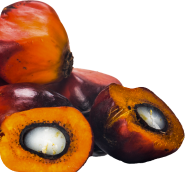
Palm oil is a versatile and valuable crop, and it plays a significant economic, social and cultural role in Malaysia, helping countless farmers, creating jobs and contributing to national wellbeing.
Palm oil is a type of edible vegetable oil that is derived from the fruit of the oil palm tree, scientifically known as Elaeis guineensis. Oil palms are native to West Africa but is now grown extensively in tropical regions around the world, including Southeast Asia, Africa, and Latin America. Palm oil from Malaysia and Indonesia account for 85% of today’s production, but there are 42 countries which produce it.
This versatile and widely used oil plays a vital role across multiple industries from foodstuffs and cosmetics through to biodiesel. As a result, global demand for palm oil has increased exponentially over the past several decades.
Palm oil’s natural origin aligns with the trend towards using more natural and plant-based ingredients in cosmetics and personal care, catering to consumers seeking products with fewer synthetic additives.
According to the Malaysian Palm Oil Council (MPOC), over 600,000 smallholder farmers are directly involved in palm oil production, supporting their families and local communities. These farmers cultivate small plots of land, enabling them to participate actively in the nation’s economic growth.
Globally, the RSPO estimates that oil palm farming provides an income for over 7 million smallholder famers. These farmers are crucial to the socio-economic development of their communities: in Malaysia, palm oil has been a key contributor to reducing poverty from 50 per cent in the 1960s to just 5 per cent today, with smallholder production accounting for 40 per cent of total palm oil plantation areas.
It is also a major contributor to Malaysia’s economy, accounting for a significant portion of the country’s exports. In 2021, the gross domestic product (GDP) contribution from palm oil in Malaysia was estimated to be at 2.5 percent of its GDP.

Palm oil and the production of its derivatives are a major component of Malaysia’s industrial base, and are its main global agricultural export. This revenue bolsters the country’s overall economic growth, supporting infrastructure development, healthcare, and education initiatives.
The broader palm oil industry is also a significant employer, offering a diverse range of jobs. From plantation workers and mill operators to researchers, technicians, and logistics personnel, the industry provides work across various skill levels. It also promotes rural development by creating jobs in areas that might otherwise face limited employment prospects.
Considering the importance of palm oil to Malaysia’s economy, any ban on palm oil would have far-reaching consequences. The loss of revenue from exports would lead to a significant economic downturn, impacting those sectors that rely on palm oil as a raw material. The MPOC states that such a ban could result in the loss of hundreds of thousands of jobs, destabilizing rural communities and hindering progress towards poverty reduction.
Boycotting palm oil is not the answer. Palm oil can be a force for good. Instead, we need to demand more action and work together to tackle the issues and promote sustainable palm oil.
By addressing sustainability challenges through certifications like Malaysian Sustainable Palm Oil (MSPO) Certification Scheme and Roundtable on Sustainable Palm Oil (RSPO), Malaysia can continue to reap the economic benefits of palm oil while protecting the environment. It is crucial to find solutions that align the growth of the palm oil industry with sustainable practices, ensuring the future for both Malaysia and the planet.